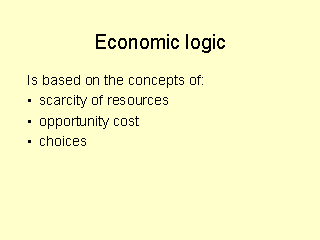 |
Economic logic is based on the notion of scarcity, according
to which needs outstrip resources. By resources we mean staff,
time, buildings, capital, goodwill, equipment, power and all
else that we need to use to meet a need. In order to trade
resources and services, money is used. It is for this reason
that often the term "resources" is used as synonymous with money.
As resources are scarce it is necessary to make choices not just
on which needs should be met and which should not but also on
assessing up to which point several different needs should be met.
However, as resources are scarce each decision to use resources
implies a sacrifice. This is because once resources are used in a
certain way, they cannot be used in an alternative manner. The
economic concept of cost and benefit derive from this principle.
A benefit is what is gained by meeting the need I have chosen to
meet and cost is the benefit which I would have obtained had I used
the same resources in an alternative manner. For this reason in
economic evaluation the costs we attempt to measure are called
opportunity costs, to remind us that the cost of our actions is
that of benefits foregone.
|
